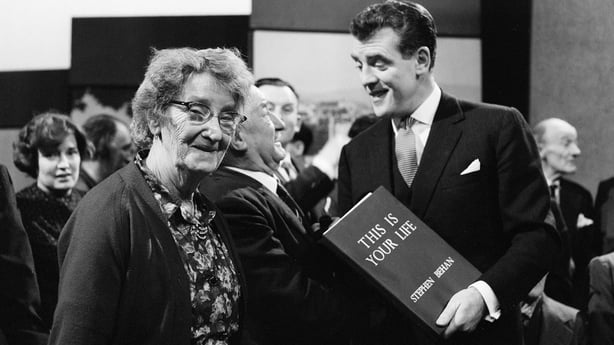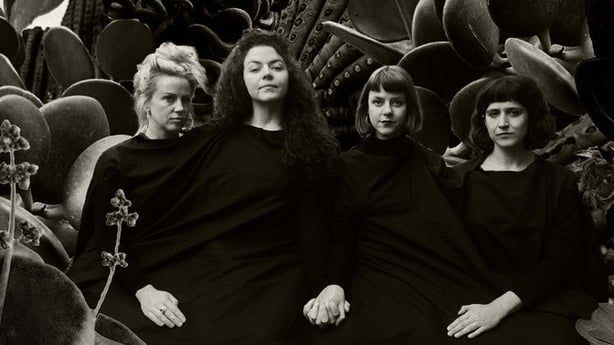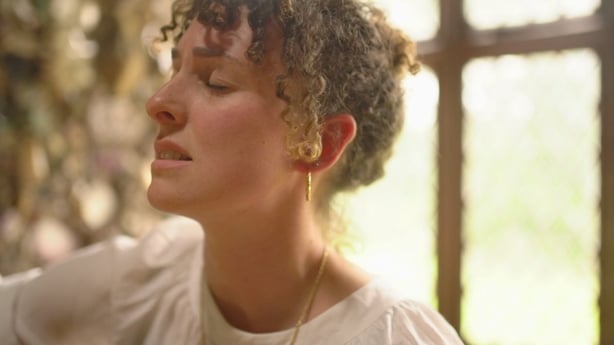Newly reissued, Rebel Irishwomen is a unique and rare recording from seminal music label Claddagh Records, featuring the voices of three extraordinary Irishwomen who were particularly associated with the 1916 Rising: Helena Molony, Maud Gonne McBride and Kathleen Behan.
This new 2022 version of Rebel Irishwomen also includes new interpretations of the music and songs heard in the original issue, from singer Niamh Bury and the female vocal group Landless.
Below, Ríonach uí Ógáin, former Director of the National Folklore Collection, reintroduces Rebel Irishwomen.
Rebel Irishwomen, the 1966 release, brought listeners into the personal experiences, recollections and songs of three women who were particularly associated with the 1916 Rising.
As Cathal Ó Seanáin wrote in the sleeve notes at the time, Helena Molony, Maud Gonne MacBride and Kathleen Behan, were 'among the militant nationalists' who were passionate about Irish independence. This reissue reminds us of the significance of the 1966 commemoration and opens a window on the deeper impact of the role of women and the ways in which their role had been previously represented.
In 1947, The Bureau of Military History was established to record the experiences of those who took part in the fight for independence. These included almost two thousand ‘witness statements’ that were made available following the death of the last witness. The richness of this resource emerged in stories told in the rebels’ own words. The personal and subjective memories of the rebels in the heat of the action give an authentic, immediate reflection on the motivations and experiences of the participants.
We need your consent to load this Spotify contentWe use Spotify to manage extra content that can set cookies on your device and collect data about your activity. Please review their details and accept them to load the content.Manage Preferences
Additional value is gained through audio-recordings of personal history, such as Helena Molony’s memories on this Claddagh reissue. Accounts such as these had not hitherto been recorded in diaries or letters. There were some rare exceptions such as Margaret Skinneder, who published her autobiographical work Doing My Bit for Ireland the year after the Rising. The role of women in 1916 had been overlooked, and Claddagh were to the fore in redressing this imbalance with the original 1966 release.
In the book 1916 in 1966: Commemorating the Easter Rising by Mary E. Daly and Margaret O’Callaghan, we are told: ‘One of the predictable aspects of the 1966 commemoration is the relatively low prominence given to women.’ Thus, in addition to allowing us enter the world of the 1916 Rising, the 1966 release helped redress the gender imbalance of that commemorative year.
We need your consent to load this rte-player contentWe use rte-player to manage extra content that can set cookies on your device and collect data about your activity. Please review their details and accept them to load the content.Manage Preferences
Listen: Rebel Irishwomen on The Ryan Tubridy Show
Maud Gonne is probably the most prominent of the women of 1916 and had been recorded by Radio Éireann. Describing her own activity on Easter Monday 1916, Helena Molony’s dedication and passion draw the listener in. Mary McAuliffe and Liz Gillis in Richmond Barracks 1916: ‘We Were There’: 77 Women of the Easter Rising relate how the women inspired each other. Helena Molony is quoted as saying: ‘I was a young girl dreaming about Ireland when I saw and heard Maud Gonne speaking ... in Dublin one August evening in 1903... She electrified me and filled me with some of her own spirit’.
Helena joined the cultural, feminist, organisation Inghinidhe na hÉireann [Daughters of Ireland]. She died of a stroke, aged eighty-four, the year after the original Rebel Irishwomen was released. We are indeed fortunate to still be able to listen to her voice.
The song tradition of Ireland is overflowing with themes associated with rebellion, insurrection, uprising and war. Popular song played a central role in documenting the effects, the personal reality and the memories and beliefs of some of the men and women of 1916.
In addition to the well-known verses by Peadar Kearney, as sung by his sister Kathleen Behan on this recording, dissenting women such as Maeve Cavanagh, Eva Gore-Booth, Winifred Letts, Lily M. O’Brennan and Dora Sigerson all raised a poetic voice. There was a sense of a united cause in the songs and poems around 1916 and rebel songs continued to be made following the Rising.

Kathleen Behan was a courier to the GPO during the Rising. She proclaimed her own Republican spirit, and aged ninety-one, she made other recordings - once again underlining the powerful effect of personal accounts. Her taped reminiscences were published as Mother of All the Behans (1984). Spoken word recordings become more valuable and significant with the passing of time and this reissue by Claddagh creates an opportunity to hear first-hand accounts from women whose voices are now silent.
This reissue is also particularly welcome as we draw to the close of the decade of centenaries as it offers an opportunity to hear the special contribution of personal histories from these brave women. In addition to celebrating the rebel women who were active in 1916, this new 2022 release also includes new interpretations of the music and songs heard in the original issue.
These new versions illustrate how fresh and vibrant the songs remain in the twenty-first century in the hands of outstanding artists of the stature of Niamh Bury and the female vocal group Landless. Both the personal memories and the songs give us an opportunity to share in the feelings experienced by the rebel women caught in the midst of the terror, death and drama of the 1916 Rising.

Garech Browne was a great supporter of women throughout his life. When Garech established Claddagh Records in 1959, he set about recording female artists almost immediately. Dolly, a spirited and enchanting album by Dolly MacMahon, was one of the early albums released. Garech’s own mother, Lady Oonagh Guinness, was a strong woman who revelled in the company of interesting people. She was a hostess par excellence. She introduced Garech to so many people. Oonagh stood out because she dared to do what most other women didn’t... she encouraged artists to give vent to their talents and to be a liberator of women who dared not to defer.
For many, the 50th anniversary of the Easter Rising in 1966 was a thorny topic as it elicited mixed reactions from a great many people whose memories were fresh to the past, not to mention interpretations. Looking back now, Ireland had an old order when Rebel Irishwomen was first being imagined by the 28 year old Garech. It was an order that was about to be challenged by the Succession Act, introduced by a young Charles Haughey, legislation that gave a wife the automatic right to inherit assets even if her husband had written a will excluding her. Garech felt that Claddagh Records should play its own part in commemorating 1916 but with an approach that came from a different perspective. It emerged from a strident belief that gender was irrelevant when it came to encouraging and showcasing talent. And that was how Rebel Irishwomen came to life.

Garech knew Kathleen Behan from visits to Luggala with her son, Brendan; Kathleen had a rich political pedigree, her brother was Peadar Kearney, composer of the National Anthem. In other aspects of his life, women also played an important role. He appointed Mary Hayes to bring order to his library of some 15,000 books. At the time of his death, Margaret Traynor was tasked with chronicling Garech’s extensive wardrobe, consisting of hundreds of suits and pairs of shoes. Rebel Irishwomen stands as a defining moment in the history of Claddagh Records. It demonstrated Garech’s, and the label’s, commitment to the right of Irishwomen to be heard both politically and culturally: Helena Moloney, Katheleen Behan, Maude Gonne MacBride, Julia Clifford, Dolly MacMahon, Sarah Keane, Rita Keane, Dolores Keane, Máire Mhac an tSaoi, Máire Áine Ní Dhonnchadha, Veronica McSweeney, Bernadette Greevy, Eilín Ní Chearna, Áine Cheaist Uí Laoithe, Róisín Ní Chéileachair, Aoife Granville, Deirdre Granville and Mary MacNamara.
Rebel Irishwomen (Cladagh Records) is out now on LP, CD and digitally

